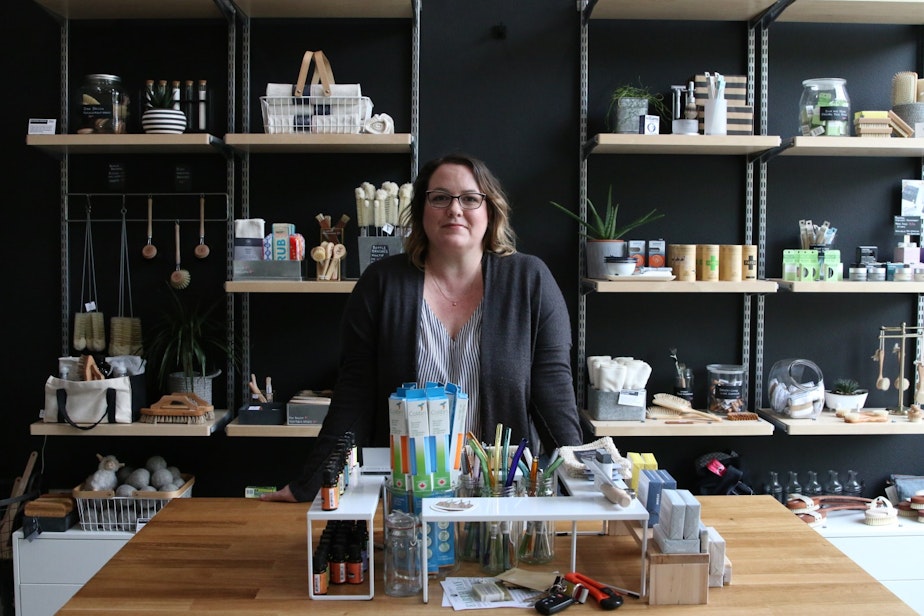These West Seattle businesses need affordable housing to survive

You might think the high cost of housing is mostly a problem for renters. But in the West Seattle Junction neighborhood, it’s also a threat to some small businesses: They’re wondering if affordable housing built under MHA rules will come soon enough to help them.
One by one, Sarah Stegner listed the employees she has lost due to the high cost of housing.
There was the employee who, for four years, lived upstairs above the store. A mom with a special needs child and the shortest commute in the world. But in one day, the employee's rent was raised from $1,100 to $2,200. She threw a dart at a map and ended in Missouri, where she was able to buy a home.
Another employee discovered the home she'd been renting was being sold out from under her, so she moved to Wisconsin.
The problem isn't restricted to employees who rent, Stegner said. Two of her employees, including one who'd been with her for 10 years, owned homes, but they couldn't resist the lucrative offers on their homes. They cashed out and moved to Oklahoma and rural Oregon.
Stegner is the third owner of a 24-year-old consignment shop called Kid Friendly Footwear at Again and Again. She sells used clothes and new shoes. Her database of customers includes nearly a quarter of the population of West Seattle.
Sponsored
The business has lasted this long, Stegner told me, because she has always had a stable team of dependable, talented employees, many of them moms who wanted a job while the kids were in school.
But the last two years, she has not been able to hold onto employees.
“There are no people to work, because the housing is so expensive,” she said.
Now Stegner staffs the store herself, with occasional relief from an old friend. Stegner has had to put off ambitions to upgrade her website because she doesn't have the time. She's cut down the store's hours. It used to be open seven days a week, but now it's only open five, so she has time to do the bookkeeping and enjoy an occasional day off.
Stegner said another consignment shop nearby now operates only as a sort of pop-up on the weekends because it doesn't have enough employees.
Sponsored
Left to market forces, new apartments tend to have higher rents than a renter can pay doing part-time work sitting behind a cash register. Many experts argue that increasing the supply of market rate apartments will eventually push all rents down. But small businesses are still waiting for the trickle-down benefits of this increased supply to reach employees earning lower wages, for whom "your first month's free" at a high-rent apartment building isn't going to be enough. And while those business owners wait, their employees leave the city.
Seattle’s new Mandatory Housing Affordability rules were meant to address this problem. In March, Seattle passed the sweeping new zoning rules allowing developers to build taller buildings. In exchange, they have to build, or pay fees so that others may build, some affordable housing. The new rules, sometimes referred to simply as MHA, will reshape neighborhoods in different ways for years to come.
One way MHA could reshape neighborhoods is by helping people like Stegner hold on to employees.
“That’s nice,” Stegner said of the new rules, “But I don’t… I don’t think it’s enough.”
Only a handful of affordable apartments will be built for every new apartment building, and the demand for them is overwhelming. Plus, most of the affordable units won’t start hitting the market for a couple years because it takes so long to get them approved and built.
Sponsored
The burdens faced by businesses like Stegner's of high housing costs faced by small businesses like this shoe store raises a question: Could the shortage of affordable housing reshape what kind of businesses survive here?
It’s hard to say, because small businesses face a variety of obstacles, from housing to healthcare. But while some businesses struggle to stay in their old spaces, other businesses are anxious to get in.

Jolene Dobson owns a new businesses called Public Goods and Services, which refills your shampoo containers and sells plastic-free things like biodegradable cleaning brushes and bandages.
She doesn't have any employees yet, so she hasn't yet experienced the loss of a long-term employee due to housing costs. And because her store is the size of a postage stamp, with just 330 square feet of retail space, she can staff it by herself.
Sponsored
Dobson had wanted to find space in the West Seattle Junction, where the shoe store is, because there are more people walking around down there. But she couldn’t find a storefront there, in part because she said businesses tend to stay there a long time.
So she settled for this place, just north of the Junction. “You can pack a lot in this tiny little space," she told me.
Dobson hopes to expand her business into a larger space, eventually. And by the time she’s ready to hire, maybe some of those affordable apartments will have been built.
This month, KUOW Reporter Joshua McNichols is looking at how Seattle's upzones and push for affordable housing is being felt on the ground in neighborhoods like the West Seattle Junction and Rainier Beach.




